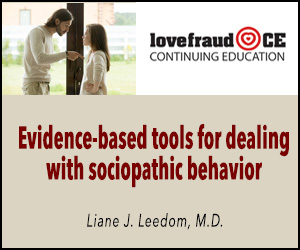By O.N. Ward
Every week, a chapter of my book, “Husband, Liar, Sociopath: How He Lied, Why I Fell For It & The Painful Lessons Learned” (available via Amazon.com, just click on the title or book cover) will be published here on Lovefraud. To read prior chapters, please see the links at the bottom of the post.
Chapter 12: What Just Happened?
Paul and I arrived back in Minneapolis late on a Saturday and spent a leisurely Sunday together. Both of us needed to return to work on Monday morning. I had not worked the entire vacation or even checked in with the office. My co-workers and team leader knew I was on my honeymoon and that I would not be in touch. Still, before I left, I had been working with an out-of-town client headquartered in Cincinnati. Some weeks we were with the client in Cincinnati, others we worked out of the Minneapolis office. I had to know where I was supposed to be on Monday morning and if I needed to book a flight to Cincinnati.
I delayed checking in with my colleagues until early Sunday evening. If I could not get in touch with someone on my team, I might wind up in the wrong location the next morning—a potentially suicidal career blunder. Why had I waited so long?
So as not to disturb Paul, who was watching TV in the living room, I made the call from our makeshift home office (no email in those days). Luckily, Brad, one of my co-workers, picked up right away. He said the team would not be travelling that week. Concern about my close call with career suicide faded. I could relax and enjoy the final evening of my honeymoon.
When I got up to head back to the living room, Paul was standing in the doorway.
“Who was that?” he snapped, face red, shoulders tensed.
“Just Brad, from work,” I replied, taken aback by Paul’s anger.
His face grew tighter. “Why are you calling Brad? Who’s Brad to you?”
“Our honeymoon’s over, and I just needed to know where to be for work tomorrow. You’ve met Brad. He’s just a colleague. I already waited too long to call. I was getting worried.”
“Our honeymoon isn’t over!” Paul said, his jaw tight and his piercing eyes trapping me like a predator immobilizing its prey. “Our honeymoon isn’t over until I say it’s over!”
I flinched. My pulse quickened. Carol, my friend from Yale, would have known what to do—look for an opportunity to leave quietly the next day, stay with a friend, and have the marriage annulled. But I did not understand what had just happened. All I knew was that I wanted Paul’s anger to go away.
“I’m sooo sorry,” I said. “I didn’t mean to upset you. I don’t need to make any more calls tonight. Let’s just make the rest of the night special.”
“You’ve already ruined it,” Paul said and then left the room.
My head felt light, and my heart pounded. I returned to the living room, where Paul was watching TV. His eyes never looked away from the screen. His tight face and closed body language made it clear I was not to join him on the couch. Clearly unwelcome, I returned to the office.
My thoughts racing, my pulse pounding, an automatic attempt to resolve the cognitive dissonance between my perceptions of Paul’s behavior and my beliefs about Paul ensued. To hold onto the assumption that my new husband was a great guy, I had to conclude there was a good reason he was upset. Maybe he’s stressed about returning to work tomorrow. Maybe he’s sad our honeymoon is over. Maybe I was inconsiderate to call then. Maybe. Maybe. Maybe. Still, I could not shake the upsetting interaction. That night, there was an icy distance between us in our bed. I slept fitfully.
The next morning, as is common to sociopaths, Paul acted as if our tense exchange the night before had never happened. Not wanting to bring up an upsetting topic before we both returned to work, I tabled the subject until the end of the day.
“You’re so silly,” Paul said, his tone soft, gentle, even playful when I broached the subject after dinner that evening. “Especially when you’re tired, you can make a mountain out of a molehill. It was nothing. I haven’t given it a second thought. I wasn’t angry. I don’t know what made you think so.”
“But you said, ”˜Our honeymoon isn’t over until I say it’s over,’ and it really upset me,” I said.
“I’d never say something like that,” Paul replied.
“Paul, it really upset me.”
He looked at me. “Do you really think I would say that?”
“You just sounded really angry with me for making that call.”
“What do you think I said?” Paul asked.
“Something like, ”˜Our honeymoon isn’t over ”˜til I say it’s over,” I replied.
“Onna,” Paul continued with the softest, smoothest, most caring voice, “I don’t remember saying that, and if I had said anything like that, I could only have been kidding.”
“It didn’t seem like that,” I replied.
“Why are you giving me such a hard time?” Paul asked. “You were clearly over sensitive last night. But now you’re getting me upset. It seems you’re calling me a liar. ”
That stopped me in my tracks. I started to doubt myself. Had I been tired? Had I been too sensitive? What did Paul actually say? Maybe he was right. I replayed the evening in my head. My recollection did not match Paul’s at all, but he was so confident and calm in his retelling of events, his recall unwavering. The clarity of the interaction the previous night receded. What had actually happened? I anchored on what was clear to me—the Paul I knew, the man I married, could never have said anything hurtful like that on purpose. It must have been me.
“I’m so sorry, Paul,” I said, anxious that I had gotten Paul upset with me. “I don’t know why I was so bothered last night. I guess I was just tired and disappointed that our honeymoon was over.”
“It’s okay,” Paul said, his silky voice returning. “I love you. Don’t worry. It’s no big deal.”
He leaned over and gave me a gentle, lingering kiss on my forehead.
I sighed. “Thanks for being so understanding. I love you, too.”
With the conflict between Paul and me officially over, I was flooded with emotions—befuddled about what had just happened, confused about my recollection of the previous evening, and embarrassed that I had been upset to begin with. But, I also felt “off—”a low-lying sense of anxiety that I could not attribute to anything specific. Paul and I had had a misunderstanding. We had talked about it. We had resolved it. I loved Paul, and Paul loved me. Everything seemed fine, but the not-so-subtle feedback from my emotions signaled that everything was not right, that something was terribly wrong.
Start from the beginning:
Go to previous chapter:
Go to next chapter:
Notes
Identifying names, places, events, characteristics, etc. that I discuss here and in my book have been altered to protect the identity of everyone involved.







































 Escaping the Sociopath and Rebuilding Your Life
Escaping the Sociopath and Rebuilding Your Life
Insidious…that is what SPs are.
The things they do to us just chip away at us until we finally realize…nothing was really what or how we thought it was.
Sociopaths are not healthy people just “having a bad day.” I used to excuse the long-term sociopath in my life by thinking to myself that he was just “having a bad day / moment / whatever.” So I was right there with you on deciding over and over that his Dr. Jekyll / Mr. Hyde behavior was *not* an indicator of a chronic personality disorder / disturbance. How could we have known, really ?
It took until I read the concept of sociopath to change my paradigm from “healthy person having a bad day” to “chronic disorder showing its true colors.” Yes, 20/20 hindsight, we should have walked away. But there was no way to know. A recent article used the phrase “a life derailed.” There it is. Thank you so much for continuing to share. Your clarity is so helpful.
Yes! I agree! One of the blog/article topics on this website is that sociopaths bank on getting the benefit of the doubt. They expect for people to make excuses for their behavior. I did what you did in the beginning –
“Oh he had a bad day at work”
“He’s feeling stressed about wanting to quit his job”
“He has some issues with is father that are wearing on him”
“He is depressed”
ETC
Hindsight really is 20/20 – in remembering certain events/moments with my ex I recall that he was irritable on a moment’s notice. Everything was fine and then all of a sudden he was angry and picking a fight. In hindsight he would pick a fight so that he could find an excuse to give me the silent treatment or for committing other forms of covert abuse.
Here is one example: One minute he was telling me how much he missed me and that he couldn’t wait to see me; the next he was mad that I was doing happy hour with a male friend and saying things like: ” i can’t believe you want to hang out with that other person over me” and then after i said: “what do you mean? I invited you” then he would say something else nasty and by then it became such a big deal for him that I (not surprisingly b/c of his behavior) would call off hanging out with my friend and then he would immediately say: “I feel sick. You should still hang out with him. I’m sorry” Etc. And so now I was consoling him for him throwing a fit about me going to hang out with another friend. A little off topic but relevant with a sociopath – he would get mad at me for wanting to hang with a male colleague/friend, but then when he would triangulate (e.g., mentioning that he thought he just saw his ex-gf with a REALLY excited look on his face and a momentary freak out – ‘I need to text her! I want to see if she is here’, etc) I would confront him and tell him that that didn’t make me feel very good (at least to have a conversation about it; I respect that SOME exes can be friends with each other), he would turn it around on me and say that I was overtly sensitive and that the two of them were just “friends” and he would get angry at me, etc. I’m pretty sure at that point in our relationship I wasn’t so far under his thumb that I immediately began apologizing, but when he used these tactics more and more, I really started thinking it was my fault and I would start apologizing right away. Anyway – F*** HIM.
Also the gaslighting – “I never said that” – it is so insidious; it makes me want to rip each on of their tongues out!
*rip each one
Their word salad and gas lighting is infuriating to me, and enraging me is exactly what my ex spath wanted.
The book, Women Who Love Psychopaths, describes some common traits of victims of spaths, including being endlessly forgiving and giving the benefit of the doubt.
Reading this article brought back painful memories, me always trying to restore peace. I would overlook things that weren’t right, blame myself because nothing made sense. And I would end up apologizing!!!. Good to know they all seem to act the same way
I, too, took too much onto myself, to ‘help’ him fix his ‘bad days’ whether they were my fault or not. (and it was always my fault, whether I caused it or not)..as time went on, the bad days were longer and longer, the ‘good times or good days’ got fewer and fewer. He could go into a furious rage over a trifle..a few minutes or half a day later, calm and collected, as if nothing had happened, totally puzzled as to why I was still an emotional wreck. His apologies were few or so phoney, I no longer believed them. These people are NOT to be ‘fixed’ or loved or soothed into better behavior; they ARE whom they are..
It really is amazing that most of the stories on here resemble everyone else’s experience. They are all basically the same person! What you described is exactly what happened in my relationship too!
They deliberately manipulate us to take responsibility for everything they are doing wrong, evil, etc.
Yup. 🙁
Cat and mouse game. They get a great thrill from seeing that they could control you. The next day, when it didn’t matter anymore to him, he had no time to deal with your “silly” emotions. Since lying, tricks, gaslighting, whatever it takes to shut you up is reasonable to them, they do not feel your pain.
It took me a long time to realize that while they are big on invoking sympathy, fairness, compassion etc. they don’t actually share those values at all. They aren’t just hypocrites, they really really don’t share those values at all. Those values are just a “handle” to manipulate people with; they will use anything that works.
How different it is to really share your life with someone. The synergy is energizing, not depleting. They will never know what it is like to have a truly give and take relationship. They want power but don’t realize that true power is beneficial.